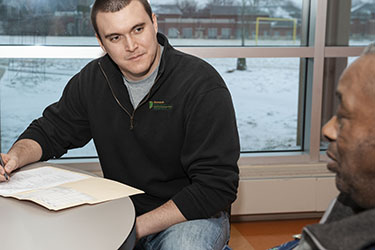Occupational Therapy
On this page:
Professional Overview
 Occupational therapists treat injured, ill, or disabled patients of all ages (infants to elderly) through the therapeutic use of everyday activities (occupations). They help these patients develop, recover, and improve their skills for work, recreation, and daily living, like getting dressed, cooking, eating, and driving. Occupational therapists also assist those with emotional disabilities, and mental illnesses learn to cope with everyday living demands and plan and structure work and leisure.
Occupational therapists treat injured, ill, or disabled patients of all ages (infants to elderly) through the therapeutic use of everyday activities (occupations). They help these patients develop, recover, and improve their skills for work, recreation, and daily living, like getting dressed, cooking, eating, and driving. Occupational therapists also assist those with emotional disabilities, and mental illnesses learn to cope with everyday living demands and plan and structure work and leisure.
Occupational therapy schools are graduate-level programs and are typically 2 to 3 years in length. An occupational therapist may have a master's or doctoral degree; the occupational therapist's entry-level degree requirement will move to the doctoral level by July 2027.
Occupational therapy practitioners work in various settings, including hospitals, nursing facilities, rehabilitation centers, home health agencies, clinics, schools and early intervention centers, industry, group homes and mental health facilities, academic programs (education and research), and government agencies many others.
General Pre-Occupational Therapy Prerequisite Coursework; Wright State Specific Courses
Most occupational therapy schools require the following prerequisites:
- Human Anatomy & Physiology (with lab): 8 semester hours (ANT 2100, ANT 2120)*
- General Biology (with lab): 4 semester hours (BIO 1120 or BIO 1070)
- Medical Terminology: 3 semester hours (BIO 1010)
- Physics (with lab): 4 semester hours (PHY 1110, PHY 1120)
- General Psychology: 4 semester hours (PSY 1010)
- Abnormal Psychology: 3 semester hours (PSY 3110)
- Lifespan Development Psychology: 3 semester hours (PSY 3410)
- Sociology: 3 semester hours (SOC 2000) · Statistics: 3 semester hours (STT 1600 or STT 2640)
*Substitutions may apply; labs are required for most science coursework.
Note. Individual requirements vary by school. It is important to research individual health professions programs for specific requirements. Contact the Pre-Health Advisor for assistance.
Academic Major
Any major is acceptable if you complete the required prerequisite coursework, recommended extracurricular activities, and present a strong application to occupational
therapy school. Occupational therapy schools seek students who have demonstrated they can do well, particularly in prerequisite courses, and followed their academic interests.
Pre-occupational therapy students often major in one of the following since many of the prerequisite courses are part of the major's academic requirements:
- Biological Science
- Neuroscience
- Psychology
- Public Health
- Rehabilitation Services
- Sports Science
Presenting a Competitive Application
You should check directly with the schools they plan to apply to for application requirements, information, and timelines. Admissions to health profession schools tend to be very competitive. While there is "no magical formula" for gaining admissions, general expectations include:
- Strong academic performance (3.5 or higher) in both your cumulative and prerequisite courses.
- Scoring at or above the 50th percentile (150 or higher in both the verbal and quantitative sections) and a four or higher in the analytical writing on the Graduate Record Examination (GRE). Many OT programs require the GRE; however, not all do.
- Occupational therapy schools require extensive familiarity with occupational therapy to gain an appreciation for and understanding of the profession. Students should:
- Shadow several occupational therapists to gain a realistic perspective of the profession.
- Gain direct patient and/or clinical exposure/experience in several unique and diverse settings and various types of patients.
- Get involved in community service, volunteer experiences, and co- and extracurricular activities on campus.
- Seek leadership responsibility, such as employment, church, community, and school organizations, including coaching, tutoring, and mentoring.
- Conduct research (however, not required) to help you understand scientific literature, how research is conducted, and distinguish credible research.
- Demonstrate the ability to balance school and responsibilities outside the classroom, demonstrating your ability to handle the difficult demands of occupational therapy school
- Exhibit strong interpersonal skills, the ability to work in teams and among a diverse group of people, and a desire to help others; communicate and listen effectively and possess skills to express your thoughts and ideas

